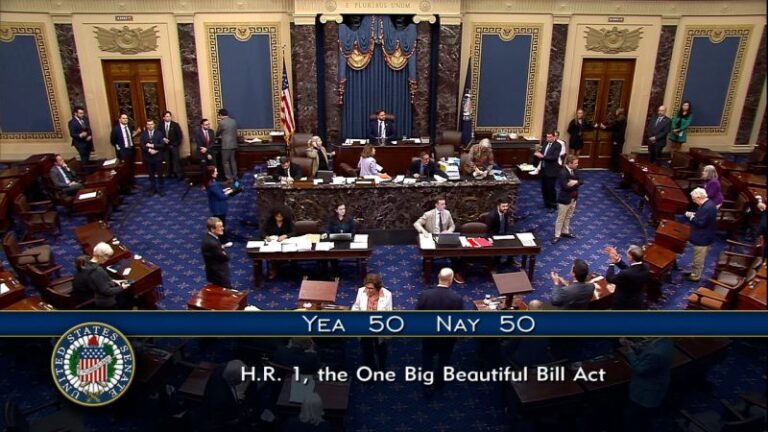In a significant legislative move, the US Senate passed its version of the budget megabill on Tuesday afternoon, a decision that could have profound consequences for the country’s renewable energy sector. The bill, which emerged after more than a day of intense debate, includes provisions that could severely curtail tax credits for wind and solar energy projects, potentially stalling hundreds of planned initiatives across the nation.
Among the contentious elements are new tax credits for coal and the termination of electric vehicle tax credits. However, the most alarming for renewable advocates is the aggressive cutoff for tax credits on wind and solar projects that are “placed in service” after 2027. This term refers to projects that are ready to supply power to the grid, and the cutoff could jeopardize numerous projects currently in development.
Impact on Renewable Energy
The bill has been described by critics as a direct attack on renewable energy. Costa Samaras, a professor of civil and environmental engineering at Carnegie Mellon University, expressed his concerns:
“This is a bill to punish renewables. There is a real need to add clean energy supply to the grid—electrifying our cars, homes, buildings, and factories. The demands from AI are all going to require new clean energy. What this bill does is make it harder and more expensive.”
Initially, the bill’s language was even more detrimental to renewables. Earlier drafts included a new tax on wind and solar industries that sourced materials from certain foreign countries, such as China. This provision would have significantly hindered these sectors. Though the final text offers some reprieve by allowing projects that commence construction within the next year to maintain their tax credits past the 2027 deadline, the overall outlook remains grim.
Political and Industry Reactions
The bill’s passage has sparked a wave of criticism from various quarters, including energy analysts, environmentalists, labor unions, and even some Senate Republicans. Notably, the addition of an excise tax caught many by surprise. As reported by NBC, several GOP Senators were unaware of who introduced this provision. Energy “philosopher” Alex Epstein, known for his pro-fossil fuel stance, publicly disapproved of the excise tax, despite influencing Republican perspectives on ending the Inflation Reduction Act (IRA) tax credits.
Elon Musk, whose companies have benefited from clean energy-related tax credits, took to social media to voice his disapproval, stating:
“The latest Senate draft bill will destroy millions of jobs in America and cause immense strategic harm to our country! Utterly insane and destructive. It gives handouts to industries of the past while severely damaging industries of the future.”
Historical Context and Future Implications
The Senate’s decision aligns with former President Donald Trump’s longstanding opposition to renewable energy incentives. Trump had campaigned on dismantling the IRA, and the original House bill reflected this promise. However, the Senate’s last-minute additions, reportedly influenced by Trump, have heightened concerns among renewable energy proponents.
Since the start of the year, the clean energy sector has been under pressure due to looming IRA rollbacks. According to energy NGO E2, approximately $15.5 billion in investment in new clean energy projects and factories has been lost, with more than $9 billion in Republican districts. This trend contradicts the administration’s goal of achieving “energy dominance,” as renewables are crucial to stabilizing the US grid amidst rising energy demands.
Renewables vs. Fossil Fuels: A National Debate
Despite the political pushback, renewable energy continues to play a vital role in states like Texas, where solar and battery storage have bolstered the grid against peak demands. As of this spring, wind and solar comprised 42 percent of Texas’s installed generation capacity. Energy analyst Doug Lewin highlights the importance of solar and batteries during heatwaves, emphasizing their role in keeping the grid stable and preventing blackouts.
However, the cultural backlash against renewables persists, fueled by both political rhetoric and grassroots movements. In Texas and Oklahoma, legislative battles and local opposition threaten to undermine renewable development, despite the clear benefits these technologies offer in terms of grid stability and environmental sustainability.
Looking ahead, the Senate’s budget bill represents a significant hurdle for the renewable energy sector. While the immediate effects are concerning, the long-term implications could reshape the landscape of US energy policy, potentially stalling progress towards a cleaner, more sustainable future.



























